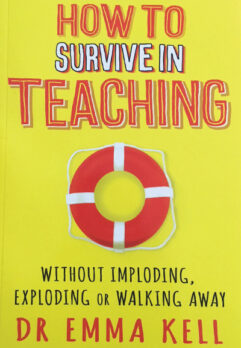My husband works harder than anyone else. He is more tired, more stressed, just… more. This is why he cannot put the bins out or take anyone to the dentist.
But he is not a teacher. I have tried to explain to him what it is like to be a teacher: it’s like someone asking you to walk to London from Leeds – in two hours. Then, when you’re halfway there, saying “I meant Newcastle”.
This is how I felt when I first started in the classroom. I was overwhelmed. I could see what had to be done, and it wasn’t necessarily that difficult, but time constraints and misdirection made it feel like an impossible task.
I know I am not the only one to feel like this. Recognition of this feeling, and concern about its implications for the future of the profession, is at the heart of Emma Kell’s book.
This isn’t simply a polemic or a trite set of tips about how to manage your marking
Kell has two decades’ experience in the classroom and is currently head of English at a London secondary school. She describes this book as “a celebration and a call to action”.
Its premise is that while the teaching profession may be in crisis, there are practical steps teachers, leaders and policymakers can take to stem the tide of teachers imploding, exploding and leaving the profession in their droves.
This isn’t simply a polemic or a trite set of tips about how to manage your marking.
Kell has collected data from a large (3,684) and diverse sample of teachers, which allows her to present an illuminating snapshot of how we currently feel. The results are presented as clear infographics: “If UK schools had 100 educators, 54 would say they experience depression directly related to their job, 91 would not consider becoming a headteacher, seven would say they feel their job is respected in society.”
Not many of the statistics are surprising to anyone who has recently spent time in a staffroom, but some are shocking and others deeply troubling. Similarly, some of the stories Kell relates from her interviews are heartbreaking, particularly one involving a miscarriage during the school day.
The first three chapters identify the nature of the crisis, examining the problem from national, institutional and personal perspectives. The three standout issues are, inevitably, workload, leadership and the myriad pressures created by the need to feed the data beast. The remaining chapters explore ways in which the challenges might be ameliorated, if not overcome.
I particularly liked the suggestion that we should spend more time in our departments working out what went right, and not just where we went wrong.
Not many of the statistics are surprising to anyone who has recently spent time in a staffroom
Much of her practical suggestions apply to any profession: all young professionals need to be supported and mentored so that they can learn how to be firm about work/life boundaries by managing expectations on all sides. Likewise, the best leaders in any profession will be bold, concerned about wellbeing and genuinely appreciative of those who work with them.
Kell reminds us that “we are not alone”, advising us to ditch the Messiah complex, kill off the martyr and get rid of our guilt. She implicitly identifies a conflict at the heart of this crisis.
Most teachers want autonomy, creativity and to be able to express their individuality and passion for their subject. Most teachers also want to be brilliant teachers and to make a difference to the young people that they teach. Many of the strategies that might resolve the workload crisis (consistent planning, routine lessons, textbooks, leaving on time) are anathema to teachers.
The book’s perspective is sometimes muddled: at times it seems addressed to leadership, at others to trainees.
Whilst this might make for a more rounded view, it’s hard to understand who exactly the intended audience is, who might put the suggestions into effect. It is too short to be able to speak effectively to “all teachers, everywhere” as advertised.
My favourite solution to the crisis was one I recently saw on Twitter: reduce teacher workload by giving teachers less work. If you don’t want to implode, explode or walk away, heed Kell’s call to arms: just say “no”.













Your thoughts